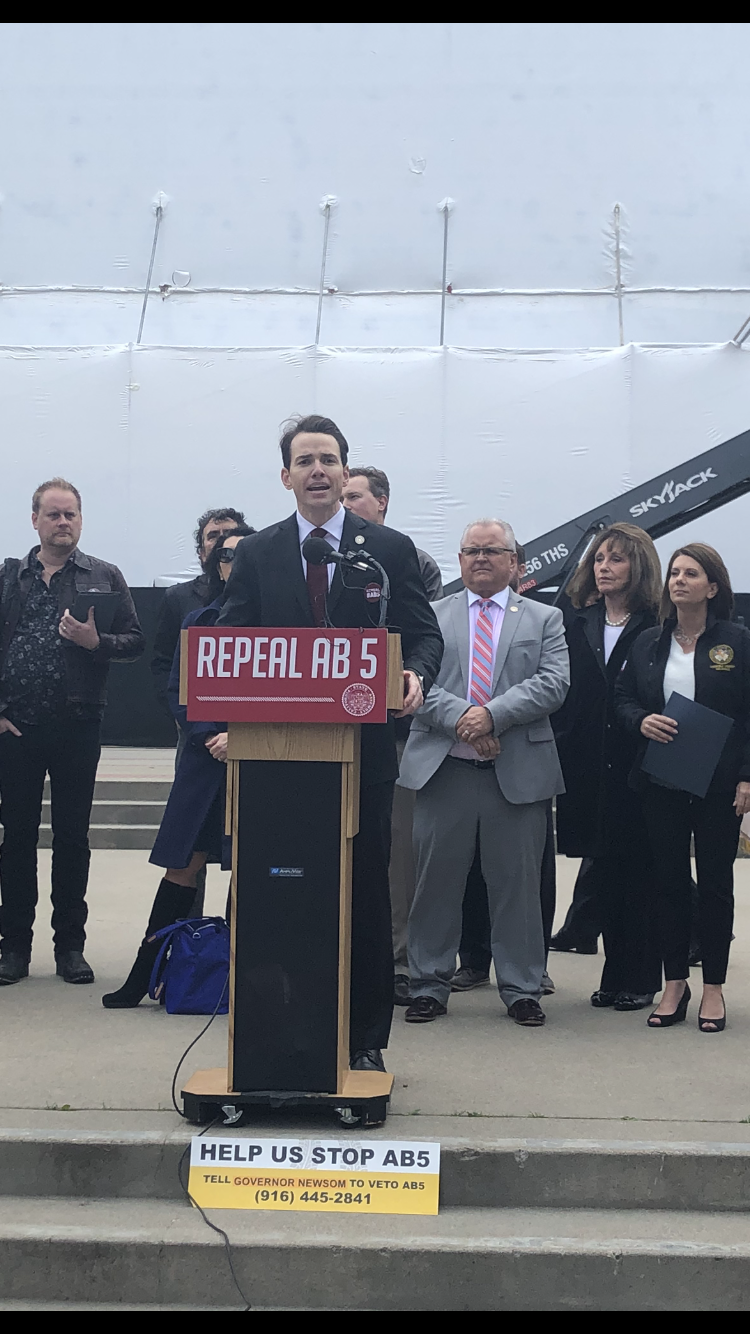
Assemblyman Chris Holden. (Photo: Kevin Sanders for California Globe)
Underrepresented Communities Now Required on Corporate Boards Under AB 979
The Secretary of State may impose fines of $100,000 to $300,000 for violations of this law
By Chris Micheli, September 30, 2020 3:50 pm
Assembly Bill 979, by Assemblyman Chris Holden (D-Pasadena) was enacted during the 2020 Legislative Session to ensure publicly-traded corporations have individuals on their boards of directors from underrepresented communities. AB 979 was signed into law by Governor Newsom on September 30. The bill amends Section 301.3 and adds Sections 301.4 and 2115.6 to the Corporations Code.
Section One of the bill sets forth nineteen findings and declarations. Among the findings are the following:
“According to 2018 data from Deloitte and the Alliance for Board Diversity, the percentages of Fortune 500 company board seats held by people identified as African American/Black, Hispanic/Latino(a), and Asian/Pacific Islander were 8.6 percent, 3.8 percent, and 3.7 percent, respectively.”
“According to the Latino Corporate Directors Association, there are 662 publicly traded companies headquartered in California. Two hundred thirty-three of these companies have all White boards of directors as of this year.”
“More racially and gender diverse boards further the goals of the Sarbanes-Oxley Act of 2002, which pushed for more independent boards that decrease the likelihood of corporate fraud.”
“Therefore, it is the intent of the Legislature to require, by January 2023, every publicly held corporation in California to achieve diversity on its board of directors by having a minimum of directors from underrepresented communities on its board, as specified in this measure.”
Section Two of the bill amends Corporations Code Section 301.3(c) to require the Secretary of State to publish no later than March 1, 2020 and annually thereafter the information required by new Section 301.4(c).
Section Three of the bill adds Corporations Code Section 301.4 to require that, no later than the close of the 2021 calendar year, a publicly held domestic or foreign corporation whose principal executive offices are located in California must have a minimum of one director from an underrepresented community on its board. A corporation may increase the number of directors on its board to comply with this section.
In addition, no later than the close of the 2022 calendar year, a publicly held domestic or foreign corporation whose principal executive offices are located in California complies with the following:
(1) If its number of directors is nine or more, the corporation shall have a minimum of three directors from underrepresented communities.
(2) If its number of directors is more than four but fewer than nine, the corporation shall have a minimum of two directors from underrepresented communities.
(3) If its number of directors is four or fewer, the corporation shall have a minimum of one director from an underrepresented community.
Moreover, no later than March 1, 2022 and annually thereafter, the Secretary of State must include in its required report specified information, including the number of corporations subject to this section and those that are no longer publicly traded. The law defines “Director from an underrepresented community” means an individual who self-identifies as Black, African American, Hispanic, Latino, Asian, Pacific Islander, Native American, Native Hawaiian, or Alaska Native, or who self-identifies as gay, lesbian, bisexual, or transgender.
In addition, the Secretary of State may impose fines for violations of this law for failure to file board member information in the amount of $100,000 and $300,000 for additional violations.
Section Four of the bill adds Corporations Code Section 2115.6 to specify that Section 301.4 applies to a foreign corporation that is a publicly held corporation to the exclusion of the law of the jurisdiction in which the foreign corporation is incorporated. “Publicly held corporation” means a foreign corporation with outstanding shares listed on a major United States stock exchange.
AB 979 essentially adds two new sections to the Corporations Code that are virtually identical to existing Corporations Code Sections 301.3 and 2115.5, related to females on corporate boards, and applies these sections to directors from underrepresented communities. The bill was brought forth by Assembly Member Chris Holden help address the ethnic pay gap, facilitate employment and outreach opportunities for underrepresented communities, promote board diversification, establish pipeline creation and upward mobility of diverse technical talent, and facilitate retention of that talent through company culture and development.
According to Assembly Member Holden, “since the beginning of recent social unrest, corporations have publicly messaged their support for diversity and Black lives. However, critics have pointed out this public support does not translate to diversity within a company and will not lead to long-term structural change. According to the USC Race and Equity Center, black employees in every industry tend to be concentrated in the lowest paying, least powerful positions… All of this strongly conveys to black professionals that their lives do not matter at work — hence their doubtful reactions to company statements about George Floyd.”
The provisions of AB 979 are based very closely on SB 826 (Jackson), Chapter 954, Statutes of 2018. That measure, which requires publicly traded companies to place a minimum number of women on their boards of directors, has been the subject of at least two lawsuits challenging its constitutionality. By adding the provisions of this bill to two new code sections, rather than amending the existing code sections added by SB 826, this bill’s author may avoid legal fallout that could result from court cases filed challenging the constitutionality of SB 826.
The Legislature considered and rejected arguments that the bill might violate the equal protection clause or the internal affairs doctrine. Generally, a statute that draws a distinction based upon race or ethnicity is suspect and only passes constitutional muster if it can meet the strict scrutiny test. In addition, there is a contention that attempts by one state to impose board composition requirements on corporations incorporated in another state run afoul of the so-called “internal affairs doctrine” which emanates from the U.S Constitution’s Commerce Clause. Under that doctrine, only the state of incorporation may dictate how a corporation conducts its internal affairs.
The bill supported by the American Civil Liberties Union of California, California Employment Lawyers Association, Consumer Attorneys of California, Equal Rights Advocates, HP Inc., and Insurance Commissioner Ricardo Lara. The only opposition was from the former Department of Corporations Commissioner.
Upon the Governor signing AB 979, Assembly Member Holden said, “The new law represents a big step forward for racial equity.” While some corporations were already leading the way to combat implicit bias, now, all of California’s corporate boards will better reflect the diversity of our State. This is a win-win as ethnically diverse boards have shown to outperform those that lack diversity.”
- Emergency Protective Orders in California - July 9, 2025
- Recreational Marinas in California - July 8, 2025
- Summons in California Civil Actions - July 7, 2025








“The law defines “Director from an underrepresented community” means an individual who self-identifies as Black, African American, Hispanic, Latino, Asian, Pacific Islander, Native American, Native Hawaiian, or Alaska Native, or who self-identifies as gay, lesbian, bisexual, or transgender.”
Just have the corporate board members “self identify” as any of the above “underrepresented community” That would force the state to prove you are not an “underrepresented” person.
I guess the State would force you to take a DNA test to prove you are not from one of the ethnic “underrepresented”
I am not sure what test the State would use to prove that you are not someone who self-identifies as gay, lesbian, bisexual, or transgender.
Perhaps this is just a way to keep the lawyers employed.
Will corporations add BLM, La Raza and Antifa activists to their boards or will they leave the state?
Corporations will leave CA before they comply with asinine, dictatorial, buffoonish edicts from CA politicians. More of the tax base leaving, just what CA needs. Suicide is the new DemocRAT tactic for the state. VOTE ALL DemocRAT OUT IN NOVEMBER.
I’d like more commentary on the legality of this. Can a state really compel a private company to discriminate based on gender, skin color and sexual orientation?